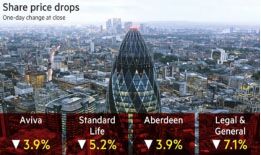Authors: Robert Lathan, Matthew Green, Ershad Chagani (Downloadable PDF)
The most significant financial and economic news story in 2016 was the June 23 decision of the British public to terminate the U.K.’s membership in the European Union. Polls and bookmakers in the days leading up to the vote had constantly maintained that, while the vote would be close, a “Brexit” was unlikely. As we now know, that position proved false. Financial markets around the world reacted quickly and sharply to the unexpected news.
The pound sank to a fresh 31-year low, dropping over 7% overnight as the fallout began to reverberate through financial markets. The word “contagion” has been used to describe the immediate effects, which have affected currency, equity, fixed-income, and other markets worldwide in the months since the vote. Further volatility attributed to the Brexit may occur when the future U.K./E.U. economic arrangement becomes clearer, with the U.K. negotiating its exit agreement with the E.U. in the coming months.
One of the “Remain” proponents’ strongest arguments toward not leaving the E.U. was that many economic entities would pull capital from the U.K. if the country exits. In the immediate aftermath of the Brexit vote, these fears appear to have not been unfounded. While the short-term effects are taking shape, the long-term effects have yet to be quantified, and likely will not be for at least a few years.
Moving forward to real estate, the discussion will look to define occurrences in a very capital-intensive industry. U.K.- based real estate funds have, not surprisingly, been one of the first sectors to be adversely affected by the Brexit vote. Whether they own shopping centers in the industrial north of England or office buildings in Canary Wharf or the City of London, the funds have been forced to take decisive actions to avoid forced selling, which could spur steep price losses across the U.K.’s real estate markets, initiating a vicious cycle of further selling and asset price drops.
With the current real estate tremors echoing those of the most recent financial crisis, the growing fear is that failure to control aftershocks from the Brexit vote will propel the broader economy into recession. During the Global Financial Crisis from 2007 to 2009, U.K. property funds were, like many American funds, faced with a deluge of redemptions and forced to halt withdrawals and/or sell assets, contributing to a slump in British property prices of more than 40% from their peak. According to the U.K. Investment Association, approximately £24.5 billion is allocated to U.K. real estate funds. The U.K. commercial real-estate market is worth about £800 billion ($1.04 trillion) in aggregate according to Mike Prew, an analyst at Jefferies Group LLC. Residential real-estate assets amount to a total of £5 trillion.
Even before the June 23 vote, it was expected that investors would pull money from U.K. property funds, as analysts warned that London office property values could fall by as much as 20 percent within three years of the country leaving the E.U. As anticipated, investors began to pull money from U.K. real estate funds in the lead up to the vote, depleting cash levels even before the fact. The Bank of England confirmed investor skittishness over U.K. commercial real estate in its Financial Stability Report published on Tuesday, July 5, revealing that foreign investment into U.K. commercial real estate fell by almost 50% in the first quarter of 2016.
After the vote, the first real estate fund to suspend redemptions was Standard Life Investments on Monday, July 4, with Aviva Investors and M&G Investments doing the same later that day. Within two days, Aberdeen Asset Management, Legal & General, Henderson Global Investors, Columbia Threadneedle Investments, and Canada Life followed suit. By the second week of July, ten U.K.-based property funds had suspended redemptions as investors sought to reduce real estate holdings due to the heightened possibility of a sharp downturn in British property values. American investment guru Bill Gross, currently with Janus Capital Group Inc., commented in an appearance on Bloomberg TV that “what is happening is reminiscent of Bear Stearns’ subprime funds before the Lehman debacle. The system does not allow liquidity to flow into the proper places, and it becomes worrisome because if these property funds are just one indication, then perhaps others will follow.”
While Aberdeen and several others have lifted the restrictions, as of July 14 Aviva, Henderson, M&G, Standard Life and Threadneedle remain restricted. As long as the possibility of market volatility remains, the issue of whether to end the restrictions is of concern to fund managers. As they are open-ended funds, if panic selling commences again they would have no choice but to re-suspend. Investors in open-ended funds can normally cash in their holdings at any time even though the underlying assets (office buildings, etc.) often take several months or even years to sell. Therefore, when investors rush for the exits at once, as has occurred since June 23, the funds can come under immediate pressure to sell assets to pay investors. Even then, there is also the risk that merely publicly disclosing the halting of redemptions could lead to a self-perpetuating cycle. Indeed, one analyst stated as soon as Standard Life moved to halt redemptions that it “is spooking the market.”
As mentioned, the market disruptions caused by Brexit are likely far from over. Complications could arise during the negotiations surrounding the separation agreement, a recession in property prices could be looming due to the already loftypropertyprices,furtheraddingtotheturmoil. Asaresult,theBrexitanditseffectsareanissuethatwillneedtobe monitored by all stakeholders in global real estate markets for some time.
1. EFFECTS ON U.S. CAPITAL FLOWS

With financial investors in shock over the decision, global equity markets saw the largest two-day selloff in almost 12 months, although stock levels did return to normalcy within a few days. Even though real estate markets do not experience the immediate fluctuations to economic and financial events, this discussion looks at how the U.K.’s decision to leave the E.U. can possibly impact the commercial real estate markets within the United States.
If investors chose to remove their capital from British real estate, seen previously as low risk, then the possibility of capital flows into American gateway markets increases. Beyond the June Federal Open Market Committee Meeting (FOMC), to maintain the federal funds rate at 1⁄4 to 1⁄2 percent, the United States presents a safe-haven environment for low-risk profile investors.
With New York City real estate ranking as the most valuable, the commercial real estate activity within the boroughs could stand to see greater investment. Currently, British real estate prices can nearly double the values of New York City. If the capital flows by foreign and domestic investors flood into New York City, this could lead that municipality to having a superior position to British real estate in years to follow.
Adding to the theory that United States’ gateway markets could see substantial capital influx, the U.S. multifamily sector saw $16.3 billion of foreign investment in 2015 based on the research of Real Capital Analytics (RCA). Of those investment dollars, $2 billion was comprised of British investors. An increase of investment rests squarely on the uncertainty of the Brexit decision.
Furthermore, the global haven of United States real estate persists in the following RCA data
• Total global investment in U.S. CRE grew to $94.1 billion in 2015
• The previous details a 576 percent increase from the $14.1 billion invested in 2010, when adjusted for inflation • Annualized investment capital year-to-date, as of June 2016, is projected to reach $67.6 billion
The positive effects from Brexit on the U.S. real estate market will also depend greatly on the uncertainty within the British and E.U. markets. Like the devaluing of currency, if the former safe and valuable British real estate market falls, the interest and investment of U.S. CRE in gateway markets like NYC, San Francisco, Chicago, and Los Angeles could see an increase in foreign investment.
2. U.S. REAL ESTATE INVESTMENT REMAINS STATUS QUO FOR FUND MANAGERS
Adding to the complexity for foreign investors to invest in U.S. CRE, remains the FOMC possibly increasing rates, obviously raising the cost of capital. With the decision of U.K. to leave the E.U., the risk of other countries increasing trade barriers pervades. The theme of nationalism over globalism persists in the rhetoric of the White House, particularly with interests from the conservative right. Moreover, the possible increase in the cost of capital would definitively place would be investors on the sidelines.
Further, the U.K. comprises the single largest cumulative foreign investment in the U.S. With the possibility of the continued devaluing of the British pound versus the U.S. dollar (http://www.marketwatch.com/investing/currency/gbpusd ) the purchasing power of British investors will decrease. If the FOMC raises rates at the beginning of 2017, then the U.S.’s largest foreign investor of real estate, the U.K., would possible remain on the sidelines with their capital. This could be worse possible situation for U.S. CRE as the largest foreign investor in U.S. CRE would not be able to continue their annual investment capital stream.
The possibility of continued low cap rates remains high even though Esther George remained the only opposition to elevating rates in the coming months. With the possibility of low cap rates, U.S. CRE could see increased prices in gateway markets, along with greater capital flows.
3. U.S. REAL ESTATE INVESTOR ACTIVITY IN GREAT BRITAIN POST-BREXIT
Prior to the results of the June 23 referendum, the inter-bank exchange rate had been one British Pound (GBP) per 1.4883 U.S. Dollars (USD); one day later, the pound sterling fell to 1 GBP per 1.3694 USD. In early 2017, the British pound has fallen to its lowest rate since 1985 as British Prime Minister Theresa May prepares to outline her plan for what’s being called a “hard Brexit,” a clean separation from the European Union. With the devaluation of the Pound Sterling and the relative strengthening of the U.S. Dollar, it appears that Great Britain may hold buying opportunities for U.S.-based real estate investors. Of course, such investment presents significant risk amidst the uncertainty of a post-Brexit world.
4. POST-BREXIT ECONOMIC RISKS TO GREAT BRITAIN
The primary risk that Brexit poses to investors is the impact that the referendum will have on economic activity within the U.K. With an immediate 15.2% fall in the value of the British Pound, U.K. consumers were quickly left to face the increased cost of imported goods. British consumers have proven to be resilient, as retail sales have increased on a year- over-year basis each month since the July referendum, and inflation has remained low at 1.6%.
Great Britain’s exporting industries will face substantial challenges as the British Parliament determines the country’s approach to international trade, both within Europe and globally. As a member of the European Union, Great Britain’s businesses enjoyed “passporting” rights—the right to conduct business throughout the European market. The Financial Conduct Authority reported that 5,476 U.K.-based businesses hold at least one passport to conduct business in another E.U. or European Economic Area member state. The loss of passporting rights could be devastating to U.K.-based businesses, with FTSE 100 businesses reporting approximately 77% of revenue from outside of the U.K. The FTSE 100 index is up 9.4% since June 23 (15.9% since the June 27 post-Brexit low), but is down 7.2% in USD equivalent terms.
The financial services sector, as the U.K.’s largest exporting industry, faces tremendous uncertainty as we move toward a post-Brexit Europe. £18.5bn of financial services were exported within the E.U. by the U.K. in 2014, and the industry is the U.K.’s largest tax paying sector. Potential restrictions on the ability of U.K.-based financial service firms to provide
services throughout Europe would have a detrimental impact on the industry. Over 2 million Britons are employed in financial services and the industry therefore holds a large commercial real estate footprint.
The strategies that financial services firms employ to adapt to their new operating environment will dictate the industry’s collective need for space in Great Britain, and more specifically in London’s duo of financial districts: The City and Canary Wharf. For example, financial institutions that elect to shift towards the Swiss Banking model—whereby a firm establishes subsidiaries in other European nations and services clients without passporting rights–will surely require less space in London, as management and operations would be distributed elsewhere.
A private Ernst & Young study, as reported by the Financial Times, has estimated that 83,000 jobs may be lost in the financial services sector in the seven years post-Brexit, with an additional 149,000 jobs potentially being lost in supporting sectors. With each office employee occupying an estimated average of 200 sq. ft. of space, the fallout of Brexit may directly result in over 16 million sq. ft. of office space (nearly 30 million sq. ft. when the domino effect on supporting sectors is factored in) being vacated. As London has an estimated 300 million sq. ft. of office space , this potential exodus translates to between 5% and 10% of office space in the city. In addition, firms allocating jobs outside of Great Britain will also result in an increased supply and a reduced demand for residential space as financial services professionals may be left to seek opportunities elsewhere.
5. POST-BREXIT OPPORTUNITIES WITHIN GREAT BRITAIN
Though forecasts widely predict Brexit to have a net-negative economic impact on the U.K., there are some glimmers of growth opportunity, particularly in London. The deflated Pound Sterling will contribute to increasing tourism and foreign investment in low-risk sectors. London’s tourist offerings will continue to draw visitors from around the world, and many of these tourists will experience an increase in spending power with the weakened pound.
As London becomes a more viable option for vacationers, we may see growth in the hospitality and lodging sector, as well as in supporting industries such as restaurants and West End theater productions. Pre-Brexit London was the most expensivecityintheworldintermsofthecostofanaveragenight’sstayinUSD. Astourismgrowsandthedemandfor lodging rises, there may be opportunities to convert the recently vacated residential and office space in London to hospitality uses in order to maximize the performance of assets around the city. Conversions to boutique hotels could allow real estate investors and owners to solve the challenge of high office vacancy rates while seizing the opportunity to satisfy the existing and growing hotel demand in the city.
Great Britain may also see an uptick in the level of foreign investment in real estate from countries whose currencies are not directly tied to the Pound Sterling. Although foreign investors will undoubtedly be weary of the uncertainty surrounding Brexit and the approach that Theresa May will adopt, there is a large number of trophy properties in London thatwillcontinuetoholdvalueinabsoluteterms. Theremaybeanopportunitytoacquiresomeofthesetrophyproperties at a low cost basis due to the relative value of the decreasing British Pound. Although the high level of uncertainty in Great Britain has led it to be cast as an unlikely destination for foreign capital, there are definite opportunities for U.S. and global investors looking to make strategic niche investments.
BIBLIOGRAPHY / ENDNOTES
1. http://www.marketwatch.com/investing/currency/gbpusd
2. http://www.cbc.ca/news/business/british-pound-brexit-1.3937381
3. http://www.businessinsider.com/theresa-may-to-announce-hard-brexit-plans-in-major-speech-2017-1?r=U.K.&IR=T 4. https://www.ft.com/content/b3e34540-a9a1-11e6-809d-c9f98a0cf216
5. http://www.uncsbrp.org/officespace.htm
6. http://www.worldatlas.com/articles/most-expensive-cities-in-the-world.html




